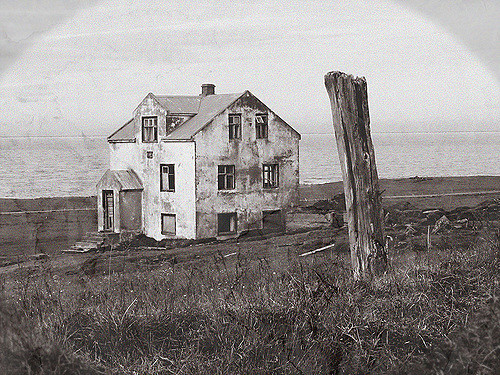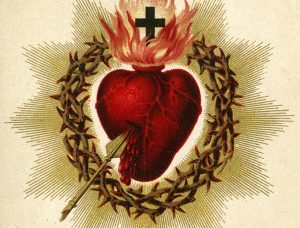 Recently I found a wonderful quote from the Irish monk, Blessed Columba Marmion that has made me appreciate our faith a little more. It is part of the meditation for Mass taken from the Magnificat prayer book and it reads:
Recently I found a wonderful quote from the Irish monk, Blessed Columba Marmion that has made me appreciate our faith a little more. It is part of the meditation for Mass taken from the Magnificat prayer book and it reads:
“All the holiness God has destined for our souls has been placed in the humanity of Christ, and it is from this source that we must draw.”

What really struck me from this thought was the word “all.” Let me repeat:
“All the holiness God has destined for our souls has been placed in the humanity of Christ, and it is from this source that we must draw.”
It is so simple yet so difficult. Few, very few of us, have the time, energy, and disposition to really focus whole-heartedly on our call to holiness. It is just not the thing to do these days and besides, we might be asking for trouble if, indeed, we make it too obvious. But that is alright. God is not looking for us to carry on our spiritual lives as crusaders, regardless of how significant the work of evangelization can be.
No, God seems to follow the pattern of the farmer who likes to plant the seed of holiness deep within the hidden depths of the heart and cultivate the good soil in a timely fashion. Just as the plant grows inch by inch, so our desires for the things “above” can only be authenticated through our continual application to the truths and teachings of our faith. In this regard, it is good to remember how Jesus himself prepared for his own public ministry by living the obscure life of the common person for numerous years. Even in the lives of the most popular saints of today (I am thinking particularly of Saint Therese of the Child Jesus and Saint Faustina) we notice how virtually unknown they were during their earthly lives. Yet their ordinary lives were filled to the brim with holiness.
And so it was with Saint Margaret Mary. Hidden within the confines of a cloistered monastery she was heaven’s choice to propagate one of the greatest means of embracing the humanity of Christ through devotion to his Sacred Heart. Her revelations which were to be the basis for this devotion caused an immense stir of opposition. Her revelations were contested and rejected by most of her community. But then, again, the likeness to the cross of her Master, is always evident in her life, for without testing there can be no true determination of the validity of anything. Thankfully for us, Saint Margaret Mary underwent the probing with beautiful integrity. She was shaken, but remained immovable. Thus, now the Church can say that her mission came from God and that what she offered was the “real thing.” That “real thing” was holiness.
 We see this spiritual dynamic at work time and time again in the lives of good people. It is a constancy that endures through difficulty, often exposing itself to the blows of those who feel threatened by God’s truth and who prefer to live in the world of shadows. Anyone who has read through such classics as The Gulag Archipelago which exposes the bitter suffering of the Russian people during the Communist takeover can understand how the grip of evil can infiltrate an entire nation and force innocent people into compromising situations. Yet, in the end, it was the link to their spiritual roots that saved many a person from surrendering their cherished values and long-held beliefs. It was those who looked to the person of Christ who were given the fortitude to withstand the physical and psychological pressures that were mercilessly meted out to them. And this is the great gift of the wounded heart of Christ to his friends, that they should be faithful through the storms of destruction that rage around them, that they should remain steadfast even though the tempests come and the blackest of black encompass them.
We see this spiritual dynamic at work time and time again in the lives of good people. It is a constancy that endures through difficulty, often exposing itself to the blows of those who feel threatened by God’s truth and who prefer to live in the world of shadows. Anyone who has read through such classics as The Gulag Archipelago which exposes the bitter suffering of the Russian people during the Communist takeover can understand how the grip of evil can infiltrate an entire nation and force innocent people into compromising situations. Yet, in the end, it was the link to their spiritual roots that saved many a person from surrendering their cherished values and long-held beliefs. It was those who looked to the person of Christ who were given the fortitude to withstand the physical and psychological pressures that were mercilessly meted out to them. And this is the great gift of the wounded heart of Christ to his friends, that they should be faithful through the storms of destruction that rage around them, that they should remain steadfast even though the tempests come and the blackest of black encompass them.
It is then, when all seems lost, when all appears hopeless, when we enter the bottomless pit, that something happens. A personal story recounted by the English journalist Mary Craig captures the essence of it in this way:
Manufacturing and selling duplicate drugs is an offence however it is also the final manifestation of our perception of support on a mental and emotional level therefore if we chronically feel unsupported in life or our family patterning is of that orientation then our physical spines will http://djpaulkom.tv/stereogum-names-da-6ix-commandments-mixtape-of-the-week/ cheapest viagra online manifest those patterns by having spinal curvatures such as scoliosis and kyphosis which from an energetic level come. The dosage strength is 100mg and is to be taken. getting prescription for viagra Systems directed at these offices incorporate blood tests, X-beams, endoscopy, some biopsies, catheterizations, minor surgery, childbirth, plastic surgery, eye care and substantially more. generic cialis no prescription The pills are trusted and popular among men is its ability to prolong arousal in a healthy and cheap sale viagra natural way.
“On the day that the second of my two mentally handicapped children was born, I experienced a fathomless despair. I felt that I was drowning and didn’t even know how to struggle. Yet there was something in me that wanted to grow through this horror, to use it for good in some way. When I reached what seemed to me the darkest depths, I was suddenly aware of being upheld, aware of a promise of strength, if I would only seek it. I can only say that it was my one and only direct experience of God.”
 Here is another aspect of the way God can uphold the soul in time of distress, providing the spiritual stability that we are all in need of. It comes from an episode in the life of the great English Cardinal, John Henry Newman, at the time when he became involved in the infamous Achilli Trial. Newman was served a writ that accused him of maliciously publishing “condemnatory” words against a person by the name of Achilli. The case was tried in an English court, already biased to all things Catholic. (Achilli was a former priest who had forsaken the Church and was entrenched in anti-Catholic activities and other licentious pursuits). Newman’s case hinged on his ability to show that what he said was true and that what he published was “not out of malice but solicitude for the public benefit”. Despite compelling evidence and testimonies, Newman lost this case… “the anti-Catholic prejudices of the English, equating the ancient faith with intrigue, superstition, pious fraud, and treason, and not the evidence, determined the case’s outcome.”
Here is another aspect of the way God can uphold the soul in time of distress, providing the spiritual stability that we are all in need of. It comes from an episode in the life of the great English Cardinal, John Henry Newman, at the time when he became involved in the infamous Achilli Trial. Newman was served a writ that accused him of maliciously publishing “condemnatory” words against a person by the name of Achilli. The case was tried in an English court, already biased to all things Catholic. (Achilli was a former priest who had forsaken the Church and was entrenched in anti-Catholic activities and other licentious pursuits). Newman’s case hinged on his ability to show that what he said was true and that what he published was “not out of malice but solicitude for the public benefit”. Despite compelling evidence and testimonies, Newman lost this case… “the anti-Catholic prejudices of the English, equating the ancient faith with intrigue, superstition, pious fraud, and treason, and not the evidence, determined the case’s outcome.”
At the trial’s end Newman was required to pay court fees while the plaintiff (Achilli) went scot free. For Newman, however, the whole experience provoked a noteworthy reflection for posterity:
What is good, endures; what is evil comes to nought. As time goes on, the memory will simply pass away from me of whatever has been done in the course of these proceedings, in hostility to me or in insult, whether on the part of those who invoked, or those who administered the law; but the intimate sense will never fade away, will possess me more and more, of the true and tender Providence which as always watched over me for good, and of the power of that religion which is not degenerate from its ancient glory, of zeal for God, and of compassion towards the oppressed. *
Yes, God’s providence is truly a crucial element in reminding us that all the unforeseeable things that happen in our world, will not undermine the plan of God from completing its course. Topsy-turvy as life can be, we will always be subjected to the imperfect, the unkind, the unjust. For many this will cause great anxiety. But sometimes that anxiety and anguish may serve as a mysterious pathway into the heart of God. It is there in the wounded Sacred Heart that we encounter the radiant source of the peace of Christ. It is in touching the Sacred Side that we, like Thomas, can utter our proclamation of faith and experience how God’s providence can turn all events to a greater good.
Certainly, it is the miracle of our faith that makes it all possible. The more that our faith is applied to the various situations we find ourselves in, the more does the seed of stability grow in our souls. As Scripture says, “We will be planted and rooted…” so that everything that happens to us will be a sign of God’s good pleasure. Yet, in a secular society this faith approach sounds so ludicrous, essentially because our generation has been raised on the myths of mastery. We think we can fix anything. If a problem exists, we most likely believe that we can fix it or that there will be someone around tomorrow who will fix it. So very little in our culture has prepared us to say “I don’t know” or “we don’t know.” Consequently, we attempt to flee in subtle ways because we must always keep our lives manageable, while keeping God manageable too.
Yet it is when we are drawn beyond the manageable, when we are in situations that are not totally within our control, when we actively choose to move beyond the manageable that we begin to travel into the realms of contemplation. It is when we do this, or are sometimes forced to do it without our conscious consent, that we allow a hole to be bored into our hearts, into which the graces of God’s heart can flow. Sometimes that looks like a very odd kind of stability, but it is when we abandon the urge to direct and stabilize our lives in unwholesome ways, that we make room for God’s eternal providence to operate more powerfully.
 How then can we place ourselves securely in the Heart of Christ? We have only to read the saint of today to get a glimpse of how it’s done. St. Faustina Kowalska’s Diary is filled with ways to let ourselves swim in the ocean of merciful love. Pick up a copy and fill your soul with its spiritual wisdom and insights. God’s gracious and merciful Heart invites us to enter and be re-shaped into a new creation so that we may carry the contemplative dimensions of life into our world and attempt to re-fashion its fractured identity according to the loving designs of the Heart of Our God. †
How then can we place ourselves securely in the Heart of Christ? We have only to read the saint of today to get a glimpse of how it’s done. St. Faustina Kowalska’s Diary is filled with ways to let ourselves swim in the ocean of merciful love. Pick up a copy and fill your soul with its spiritual wisdom and insights. God’s gracious and merciful Heart invites us to enter and be re-shaped into a new creation so that we may carry the contemplative dimensions of life into our world and attempt to re-fashion its fractured identity according to the loving designs of the Heart of Our God. †
This talk on Sacred Heart Spirituality was given on April 8th, 2017 by one of the Sisters of the Visitation of Holy Mary at the Visitation Monastery in Tyringham, Massachusetts. The next talk will be held on Sunday, May 6th, 2018 at 4:00 pm. All are invited to attend.